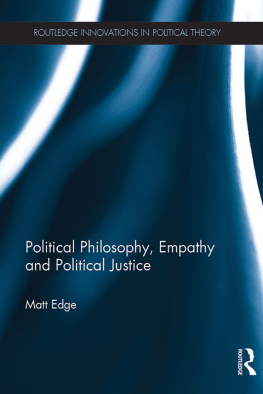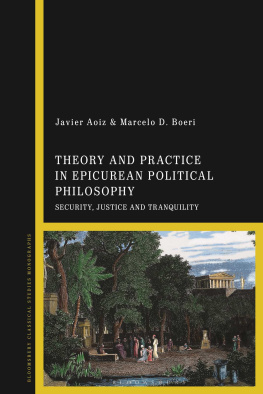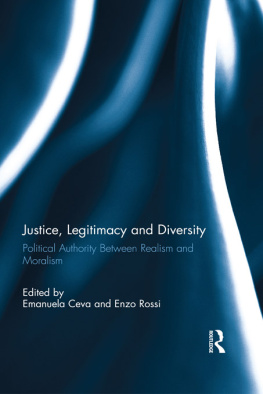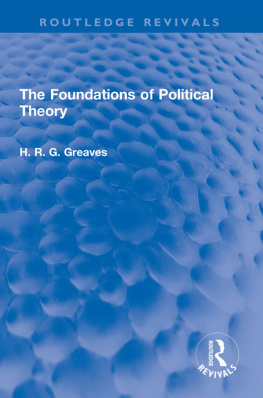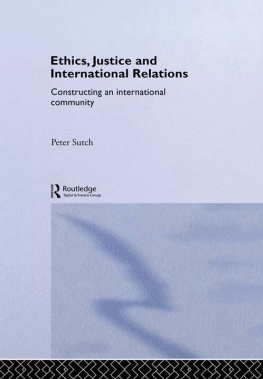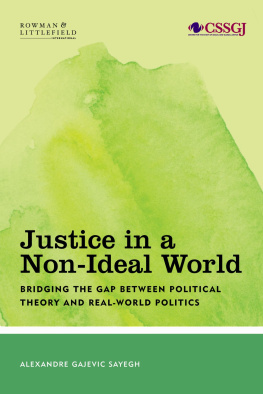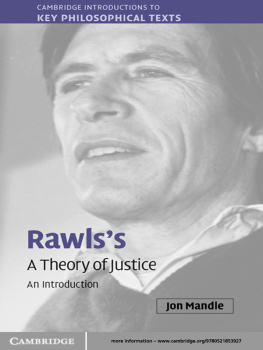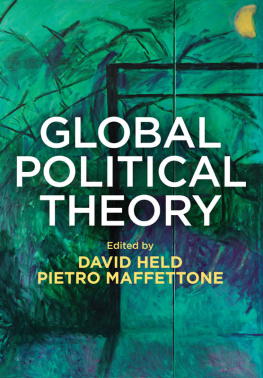Matt Edges Political Philosophy, Empathy and Political Justice is an important contribution to the growing body of literature on empathy and justice. Building on the works of John Rawls, Michael Slote and others, Edge develops an intriguing thought experiment the empathy test for generating an empathic theory of justice. He then shows how empathy can provide a bridge between ideal theory and practical affairs. Altogether, the book provides a wideranging discussion of empathy and the role it can play in promoting equal concern and justice for all.
Daniel Engster, The University of Texas at San Antonio
Edges style is informal and inviting. In an age when academic political discussion is largely dominated by various forms of liberalism and ethical rationalism, it is good to see a book that defends a crucial role for empathy in social justice.
Michael Slote, University of Miami
Clearly written, original and concise, this book is a welcome addition to the growing body of work reminding us of the importance of empathy for a more ethical and compassionate world.
Anthony Clohesy, University of Essex, UK
In Political Philosophy, Empathy and Political Justice, Matt Edge provides a compelling argument for placing the process of empathy at the heart of our understanding of justice. He masterfully synthesizes insights from philosophy, social psychology, political theory, neuroscience, history and (even) literature to make his case, his writing is accessible and transparent, and this work should interest both scholars and general readers. Even those who disagree with his particular theory of empathic justice will find absorbing ideas that should prod further reflection on what a just society requires.
Michael E. Morrell, University of Connecticut
Political Philosophy, Empathy and Political Justice
In this work, Matt Edge offers an innovative approach to political philosophy. He invites the reader to consider the question of political justice from an empathic perspective if you were asked to construct a theory of justice acceptable to members of a community you were not yourself a part of, how would you succeed in making your proposal acceptable? What tools would you rely on to construct such a theory, and why? Equally, what would make anyone qualified to write such a theory?
Using empathy, this remarkable, natural, tool human beings possess for making moral and ethical decisions, and, thereby, placing yourself as someone on the receiving end of the very theory of justice you yourself are constructing, what would you come up with? What set of alterable human structures and systems would you deem acceptable, were you to find yourself in the position of a citizen living under such structures?
Political Philosophy, Empathy and Political Justice offers a unique and compelling account of the type of free system required to pass an empathic examination at the heart of these, and related, questions, matters which define all human eras, in the constant search for political and social justice on our diverse planet.
Matt Edge is an independent researcher. His current research interests are the relationship between Rawls-style theories of justice and justice on the front line of professional practice, in social work, policing and community care, theories of freedom, participatory democracy, psychological trauma, the philosophy of Davidson and Quine, and the theory and practice of empathy.
Routledge Innovations in Political Theory
1 A Radical Green Political Theory
Alan Carter
2 Rational Woman
A feminist critique of dualism
Raia Prokhovnik
3 Rethinking State Theory
Mark J. Smith
4 Gramsci and Contemporary Politics
Beyond pessimism of the intellect
Anne Showstack Sassoon
5 Post-Ecologist Politics
Social theory and the abdication of the ecologist paradigm
Ingolfur Blhdorn
6 Ecological Relations
Susan Board
7 The Political Theory of Global
Citizenship
April Carter
8 Democracy and National
Pluralism
Edited by Ferran Requejo
9 Civil Society and Democratic Theory
Alternative voices
Gideon Baker
10 Ethics and Politics in Contemporary Theory
Between critical theory and post-marxism
Mark Devenney
11 Citizenship and Identity
Towards a new republic
John Schwarzmantel
12 Multiculturalism, Identity and Rights
Edited by Bruce Haddock and Peter Sutch
13 Political Theory of Global Justice
A cosmopolitan case for the World State
Luis Cabrera
14 Democracy, Nationalism and Multiculturalism
Edited by Ramn Maiz and Ferrn Requejo
15 Political Reconciliation
Andrew Schaap
16 National Cultural Autonomy and Its Contemporary Critics
Edited by Ephraim Nimni
17 Power and Politics in Poststructuralist Thought
New theories of the political
Saul Newman
18 Capabilities Equality
Basic issues and problems
Edited by Alexander Kaufman
19 Morality and Nationalism
Catherine Frost
20 Principles and Political Order
The challenge of diversity
Edited by Bruce Haddock, Peri Roberts and Peter Sutch
21 European Integration and the Nationalities Question
Edited by John McGarry and Michael Keating
22 Deliberation, Social Choice and Absolutist Democracy
David van Mill
23 Sexual Justice / Cultural Justice
Critical perspectives in political theory and practice
Edited by Barbara Arneil, Monique Deveaux, Rita Dhamoon and Avigail Eisenberg
24 The International Political Thought of Carl Schmitt
Terror, liberal war and the crisis of global order
Edited by Louiza Odysseos and Fabio Petito
25 In Defense of Human Rights
A non-religious grounding in a pluralistic world
Ari Kohen
26 Logics of Critical Explanation in Social and Political Theory
Jason Glynos and David Howarth
27 Political Constructivism
Peri Roberts
28 The New Politics of Masculinity
Men, power and resistance
Fidelma Ashe
29 Citizens and the State
Attitudes in Western Europe and East and Southeast Asia
Takashi Inoguchi and Jean Blondel
30 Political Language and Metaphor
Interpreting and changing the world
Edited by Terrell Carver and Jernej Pikalo
31 Political Pluralism and the State
Beyond sovereignty
Marcel Wissenburg
32 Political Evil in a Global Age
Hannah Arendt and international theory
Patrick Hayden
33 Gramsci and Global Politics
Hegemony and resistance
Mark McNally and John Schwarzmantel
34 Democracy and Pluralism
The political thought of William E. Connolly
Edited by Alan Finlayson
35 Multiculturalism and Moral Conflict
Edited by Maria Dimova-Cookson and Peter Stirk
36 John Stuart Mill Thought and Influence
The saint of rationalism
Edited by Georgios Varouxakis and Paul Kelly
37 Rethinking Gramsci
Edited by Marcus E. Green
38 Autonomy and Identity
The politics of who we are
Ros Hague
39 Dialectics and Contemporary Politics
Critique and transformation from Hegel through Post-Marxism
John Grant
40 Liberal Democracy as the End of History
Fukuyama and postmodern challenges

